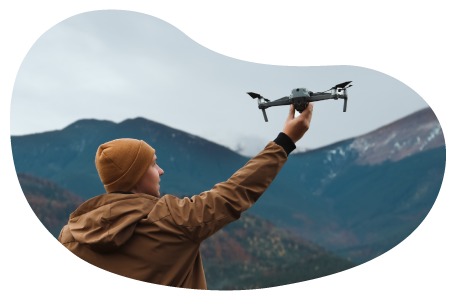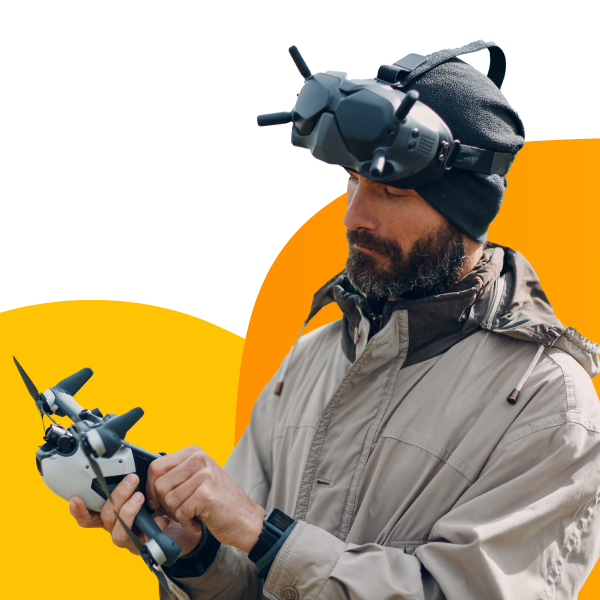
Drone Photography Business Insurance

Why is insurance a must for drone photographers?
Commercial drone photography lets you get unique shots, but it also comes with its own unique risks. If a drone hits someone or damages their property, you could be facing an expensive lawsuit. Drone insurance pays for resulting legal fees and medical expenses. It can also help cover the costs related to the repair or replacement of an unmanned aerial vehicle (UAV).

Find coverage that matches your risks
6 insurance policies every drone photographer should consider
These insurance products defend against the most common risks and liabilities faced by drone photographers.
General liability insurance
A general liability policy defends against third-party injury and property claims, such as a drone crash that injures someone or their property. It's often required for a commercial lease.
- Bodily injuries from drone accidents
- Accidental damage to property
- Slander and other advertising injuries
Business owner's policy
A business owner's policy, or BOP, combines general liability coverage and commercial property insurance at a discount. Low-risk small businesses are often eligible for this bundle.
- Personal injury lawsuits
- Damage to a drone (hull insurance)
- Business interruption coverage
Professional liability insurance
Professional liability insurance covers claims related to mistakes or poor quality of work, should a client decide to sue. It's also referred to as errors and omissions (E&O) insurance.
- Missing or low-quality aerial photography
- Professional negligence accusations
- Arriving late or missing an event
Workers' comp insurance
Workers' compensation insurance protects drone photography businesses and sole proprietors from work-related medical bills that health insurance won't cover. Most states require this coverage for employees.
- Medical costs from workplace accidents
- Disability benefits for injured workers
- Legal costs from employee injuries
Commercial auto insurance
Almost every state requires commercial auto insurance for vehicles owned by a business. It covers financial losses in the event of a car accident involving your drone photography's business vehicle.
- Auto accident legal fees
- Vandalism or other vehicle damage
- Vehicle theft
Commercial property insurance
Property coverage protects your drone and its accessories, along with other photography equipment. Add inland marine insurance for protection of drones that travel to off-site locations.
- Fires
- Storm damage
- Theft and vandalism
Drone photography insurance costs

From our customer data, here's a quick look at average drone insurance costs:
General liability: $29 per month
Business owner's policy: $46 per month
Professional liability: $34 per month
Factors that can influence your photography and videography insurance premiums include:
- Types of professional services offered, such as weddings
- Annual revenue
- Types of drones you have and their value
- Business size
- Insurance products purchased
- Policy limits and deductibles
- Coverage options, such as an additional insured
Why drone photographers choose TechInsurance
Get insured quickly with TechInsurance
Get insurance fast so you can get started working with clients. Fill out our easy online application, choose a policy, and pay online to start coverage today.

Common questions about business insurance for drone photographers
Review answers to frequently asked questions (FAQs) about drone liability insurance coverage and more.
Do commercial drone operators need to have insurance?
In almost all states, obtaining drone insurance coverage is not required by law. However, the state of Minnesota requires commercial drone pilots to carry drone insurance coverage. The exact amount of coverage depends on the type of aircraft you fly. Before flying commercially in Minnesota or elsewhere, you should double check local laws to ensure you're following state and city regulations.
Even if drone insurance policies are not mandated by state law, proof of insurance may be required by your clients or an employer before they decide to work with you.
Besides attracting clients and meeting their expectations, business insurance is also highly recommended for drone pilots for the financial protection it offers. A drone crash could result in costly lawsuits and/or medical expenses that could otherwise devastate your small business. Maintaining coverage allows you to focus on running your drone business with peace of mind, knowing that if an incident were to occur, you would be covered.
If you are operating a drone recreationally or just as a drone enthusiast, then carrying business insurance coverage isn't generally needed. Typically, a drone would be covered under your homeowner's insurance or renter's insurance.
Are self-employed drone photographers required to carry insurance?
While self-employed drone photographers might not be required by law to carry insurance, having coverage can help you fulfill contract terms and protect your business from financial risks and liabilities. However, some policies may be required based on the laws in the state, county, or city in which you operate.
For example, in most cases, if your drone photography business has employees, you'll be mandated to carry workers' compensation insurance. Workers' comp is required in nearly every state and protects your business should an assistant or worker become ill or injured on the job. This coverage is also a good idea for independent contractors and sole proprietors, who are typically exempt, as personal health insurance won't cover work-related claims.
Additionally, drone photographers who drive company-owned vehicles must maintain the state-specified minimum amount of commercial auto insurance. This policy offers financial protection if you or your employees are involved in an accident while driving a company vehicle, and will help cover medical expenses, property damage, and liability claims from the incident.
If you drive a personal, leased, or rented vehicle, look to hired and non-owned auto insurance for coverage.
Depending on your client, you may be asked to carry professional liability insurance (sometimes called errors and omissions coverage) before you can enter into an agreement with them. Professional liability protects your business from expensive claims over the quality of your work.
Even when not required, insurance coverage is a critical component for any LLC, sole proprietor, independent contractor, and start up photography business. It not only offers peace of mind, but can protect your business from potentially devastating financial and legal costs.
Do drone photographers need a license or certification?
Yes, in order to operate and run a drone photography business, you need to obtain a license issued by the Federal Aviation Administration (FAA). This license is commonly known as a Remote Pilot Certification, Part 107 license, or Part 107 certification.
To obtain a Remote Pilot Certification, you need to meet certain qualifications, such as being at least 16 years or older and being in a sound physical and mental state that allows you to fly.
The first step is to complete and pass the 60-question, multiple choice FAA Aeronautical Knowledge Test, with a score of 70% or better. The FAA has study guides online and even a free two-hour training course to prepare for the exam. After you have your test score, you can then complete an application for a drone license, which includes a background check. Once your application is approved, you'll be issued a Part 107 license.
Your Part 107 license is valid for two years. You will need to retake the exam every two years to maintain your licensure.
Depending on your state, you may also have to apply for your business license through your city or county government, while other states may direct you to a state-level office.
Business licensure offers many benefits, including:
- Tax compliance
- Credibility
- Financial benefits and credit
What other types of insurance coverage do drone photographers need?
In addition to the policies mentioned above, drone businesses that offer photography services often invest in the following types of coverage:
- Tools and equipment coverage: A type of inland marine insurance, this policy safeguards your business property (such as drones, cameras, memory cards, etc.) while it's in transit, stored at an off-site location, or in the middle of a shoot. Specifically, contractor's tools and equipment insurance is perfect for your drones and other photography business equipment that costs under $10,000 and is less than five years old.
- Business interruption insurance: If your drone photography business is forced to close temporarily due to a fire or other covered property claim, this policy will help cover lost revenue and daily operating expenses until you can reopen. It's also called business income insurance.
- Special event insurance: You may need special event insurance to cover activities outside of your typical operations, such as a wedding or festival.
- Hired and non-owned auto insurance (HNOA): Drone photographers who drive personal, rented, or leased vehicles for business purposes should carry this coverage, as a personal auto policy won't cover accidents that happen while you're driving for work.
- Non-owned liability insurance: If you are using someone else's drone for a job, this policy covers you against liabilities.
- Premises liability insurance: This insurance coverage provides protection if you are flying on someone else's property.
- Drone hull insurance: In the event of an accident that results in physical damage of the drone, hull coverage helps pay for repair or replacement costs for damaged drone parts or the entire drone itself.
Our licensed agents can help you choose insurance solutions that match your business needs, comply with state laws and other requirements, and save money on coverage. If you offer videography services, you may need additional coverage, such as specialized film and camera equipment insurance, which our agents can help you obtain from top insurance companies.

